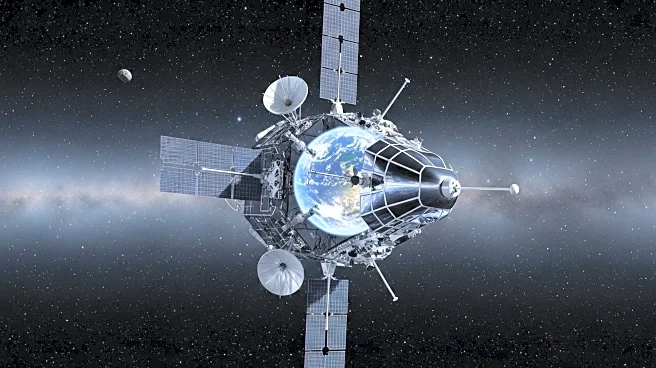What is the story about?
What's Happening?
The China National Space Administration's Tianwen 2 spacecraft has captured a selfie with Earth while on its mission to a mysterious asteroid. The image, released on October 1, 2025, shows the spacecraft with the Earth in the background, approximately 26.5 million miles away. Tianwen 2 is currently en route to the asteroid Kamo'oalewa, one of Earth's quasi-moons, and is expected to reach its destination by July 2026. The spacecraft is functioning normally and has completed several in-orbit tests, including the deployment of sampling devices. The mission aims to collect samples from the asteroid and return them to Earth by late 2027.
Why It's Important?
This mission underscores China's growing capabilities in space exploration, positioning it as a significant player in the global space race. The successful execution of such missions could enhance China's technological prowess and scientific knowledge, potentially leading to advancements in space technology and exploration. The mission also highlights the competitive nature of space exploration, as countries like the U.S. and China vie for dominance in this field. The data and samples collected could provide valuable insights into the origins of the solar system and the potential for future space resource utilization.
What's Next?
Tianwen 2 will continue its journey to Kamo'oalewa, with several months of engine burns planned to reach the asteroid. Upon arrival, the spacecraft will conduct detailed studies and collect samples. After returning the samples to Earth, Tianwen 2 will embark on a new mission to visit the main belt comet 311P/PANSTARRS around 2035. The mission's progress will be closely monitored by the international space community, and its outcomes could influence future collaborative or competitive space endeavors.
Beyond the Headlines
The mission also raises questions about international collaboration in space exploration, as current U.S. laws restrict NASA from working with Chinese space agencies. This could lead to further geopolitical tensions or inspire new policies promoting international cooperation. Additionally, the mission's success could inspire other nations to invest in their own space programs, potentially leading to a new era of space exploration.















